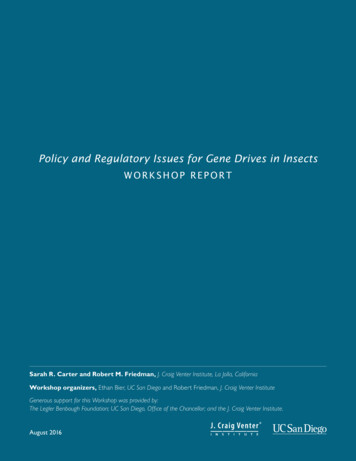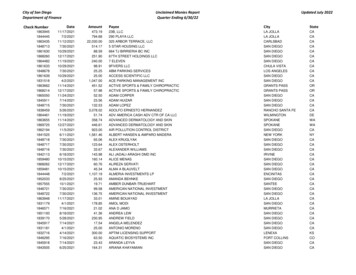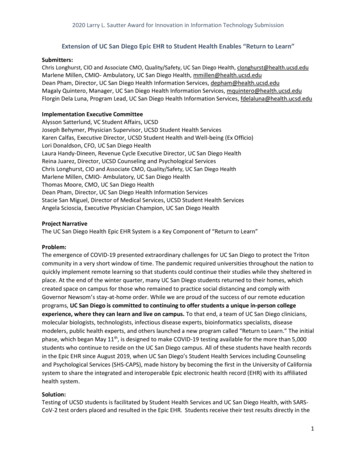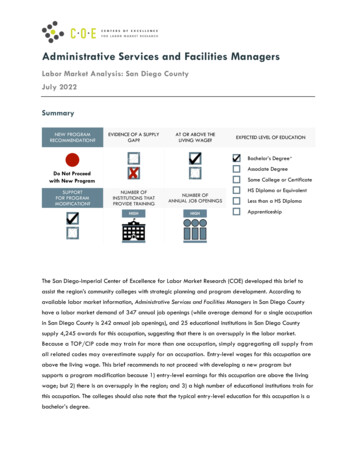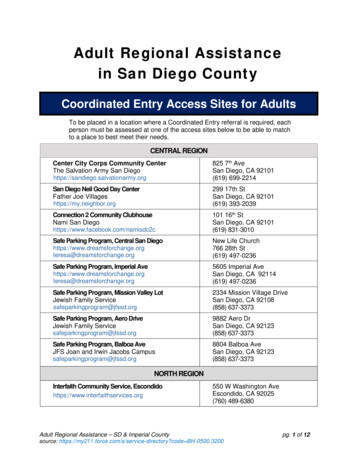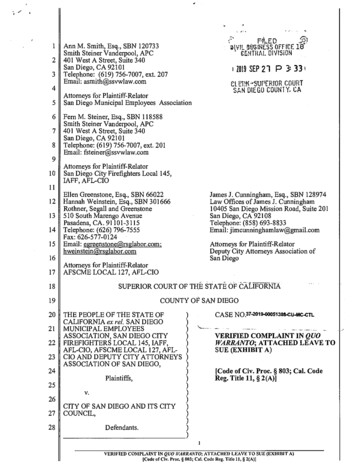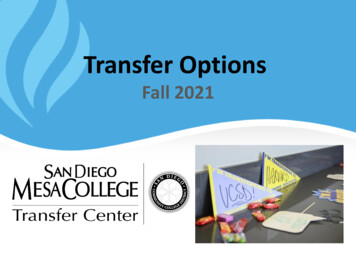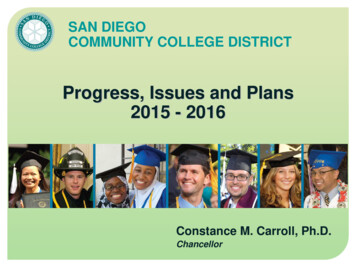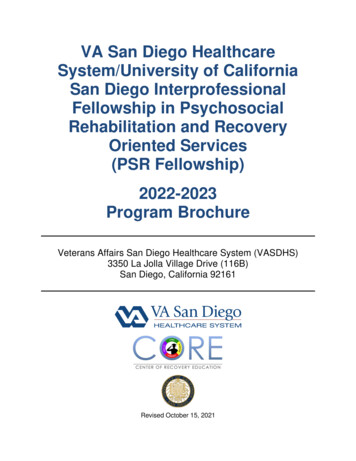
Transcription
VA San Diego HealthcareSystem/University of CaliforniaSan Diego InterprofessionalFellowship in PsychosocialRehabilitation and RecoveryOriented Services(PSR Fellowship)2022-2023Program BrochureVeterans Affairs San Diego Healthcare System (VASDHS)3350 La Jolla Village Drive (116B)San Diego, California 92161Revised October 15, 2021
Table of ContentsOur Faculty . 4Introduction . 5Facilities . 6Program Admissions . 8Financial and Other Benefit Support for Upcoming Training Year . 9Post-Residency Positions .10Training Program Structure .10Training Curriculum .12Clinical Training .13Research/Dissemination Training & the Education Dissemination Project .13Diversity Training .14Supervision .15Seminars .16Other Educational Opportunities for Fellows .17Diversity, Equity, & Inclusion (DEI) .19Core Competencies .21Evaluation Process .23Summary of PSR Fellow Duties .24Application and Selection Process .25Program Modifications Due to COVID-19 .27Contact Information .282
Dear Applicant,Thank you for your interest in the VA San Diego/UC SanDiego PSR Fellowship program. I am so glad that you areconsidering our program for your training. Our PSRFellowship is currently in its 14th year of providing exceptionaladvanced training to mental health trainees committed toserving Veterans with serious mental illness (SMI),specifically those diagnosed with psychotic disorders. Wehave trained 54 fellows from the fields of psychology, socialwork, vocational rehabilitation, occupational therapy,psychiatry, and nursing. Our trainees have gone on torewarding careers in a variety of settings, and several havestayed on locally and serve as supervisors to our incomingfellows.We are very proud to have played an instrumental role in the American PsychologicalAssociation’s recognition of SMI as a formal specialty in psychology in 2019. This will likelyprove to be a watershed moment resulting in standardization of training and improved care forpeople with SMI. By joining us, you can be part of this exciting and important movement.PSR fellows are an integral part of our award-winning, CARF-accredited PsychosocialRehabilitation & Recovery Center, the Center of Recovery Education (CORE). The CORE familyis a diverse group of talented, kind (and funny!) clinicians and scientist-practitioners who aredeeply committed to serving Veterans with psychosis. We are committed to delivering highquality, culturally competent evidence-based practices, developing and evaluating newpractices, and disseminating best practices both on an individual level with our Veterans, andmore broadly to the community through trainings, presentations, and publications.Our fellowship provides high-caliber, challenging training that propels fellows into exciting andmeaningful careers that make a positive difference in the world. If you are committed to SMI andVeteran care, thrive in a stimulating environment, and welcome the opportunity to exercise yourcreativity and cultivate your leadership abilities, this could be the place for you.Please be sure to read about our COVID-19 adaptations at the end of this brochure, and feelfree to contact me at Dimitri.Perivoliotis@va.gov with any questions. On behalf of the PSRFellowship and CORE team, I wish you all the best in your career, and look forward to reviewingyour application.Warmly,Dimitri Perivoliotis, Ph.D.Director of Training
Our FacultyBlaire Ehret, PhD*Psychologist, CORE AssociateProgram Manager, VASDHS JointDoctoral Program in ClinicalPsychology Practicum Coordinator,UCSD Psychiatry Assistant ClinicalProfessorSpecialties: Suicidology; Developer ofCaring Cards intervention; SMItraining and administrationVanessa Girard, LCSW*Social WorkerSpecialties: Grief; suicide prevention;homeless and dually diagnosedVeteransChristina Holsworth, MS, CRC*Vocational Rehabilitation SpecialistSpecialties: Supported Employment;vocational rehabilitation in earlypsychosis; clinic health & safetyDimitri Perivoliotis, PhDPsychologist, CORE ProgramManager, PSR Fellowship TrainingDirector, UCSD Psychiatry AssociateClinical ProfessorSpecialties: Co-developer ofRecovery-Oriented Cognitive Therapyfor SMI; psychosis training andadministration; psychedelic-assistedpsychotherapiesPatrick Sullivan, LCSWCORE Social WorkerSpecialties: Homeless Veterans;attachment-oriented psychotherapy* Former VASDHS/UCSD PSR FellowsYuliana Gallegos Rodríguez, PhD*Psychologist, VASDHS Director ofPeer Support Services & LocalRecovery Coordinator, UCSDPsychiatry Assistant Clinical ProfessorSpecialties: Peer support; culturaldiversity and competence; LatinxVeteran issues; complementary &alternative treatmentsEric Granholm, PhDPsychologist, VASDHS Impact Unit 2Co-Leader & Chief of Psychology,UCSD Psychiatry ProfessorSpecialties: Co-developer of CognitiveBehavioral Social Skills Training andmobile digital interventions forpsychosis; administration andleadershipMichelle Kirby, MDivChaplain, ACPE Certified Educator,VASDHS CPE Program DirectorSpecialties: Spiritual care for mentalhealth & addiction/recovery; LGBTQ Fiza Singh, MDPsychiatrist, CORE Medical Director,UCSD Psychiatry Associate ClinicalProfessorSpecialties: Recovery-orientedpsychiatric medication management;EEG neurofeedback in psychosis;training of psychiatry fellowsEmily Treichler, PhDResearch Psychologist, UCSDPsychiatry Assistant ProfessorSpecialties: Developer of CollaborativeDecision Skills Training interventionfor SMI
IntroductionThe purpose of this brochure is to describe the VA San Diego Healthcare System(VASDHS)/University of California San Diego (UCSD) Interprofessional Fellowship Program inPsychosocial Rehabilitation and Recovery Oriented Services (PSR Fellowship). TheVASDHS/UCSD PSR Fellowship was established under the leadership of Eric Granholm, Ph.D.in 2007, and is part of a national program composed of six VA sites, coordinated by the VISN 5Mental Illness Research, Education, and Clinical Center (MIRECC) in Baltimore, Maryland. Thebroad purpose of the PSR Fellowship program is to develop future mental health leaders withvision, knowledge, and commitment to transform mental health care systems in the 21st centuryby emphasizing functional capability, rehabilitation, and recovery of individuals with seriousmental illness. The VASDHS/UCSD PSR Fellowship offers a major area of study in seriousmental illness (SMI) to clinical psychology fellows as well as fellows from other disciplinesincluding social work, vocational rehabilitation, chaplaincy, nursing, and/or psychiatry. At least90% of fellow time will be devoted to training in psychosocial rehabilitation of people with SMI,including outpatients diagnosed with psychotic disorders at the CARF-accredited VASDHSPsychosocial Rehabilitation & Recovery Center throughout the training year and Veterans at theVASDHS inpatient psychiatry unit at least during a 12-week mini rotation. For psychologyfellows, the fellowship will likely serve as excellent preparation for eventual board certification(ABPP) in SMI. For chaplains, the fellowship is excellent preparation for Mental Health specialtycertification; they are expected to receive 4 units of Clinical Pastoral Education (CPE)concurrently with their PSR training.Training for clinical psychology fellows in the VASDHS/UCSD PSR Fellowship program is basedon the scientist-practitioner model, focused on creating a foundation in the delivery anddissemination of evidence-based clinical practices. Psychology fellows of the PSR Fellowshipare formally a part of and adhere to the guidelines of the larger VASDHS/UCSD ClinicalPsychology Postdoctoral Residency Program, which has been accredited by the AmericanPsychological Association since 2010. This brochure describes the PSR Fellowship program forall disciplines. At the end of the PSR Fellowship program, all fellows are prepared for VA oruniversity medical center careers that integrate clinical, training, scholarly and leadershipactivities. The fellowship emphasizes training in professional practice, specifically the provisionof psychosocial rehabilitation services. Fellows will learn to deliver high quality clinical care, tobe critical contributors to and consumers of the scientific literature, and to let each of theseareas inform the other.The VASDHS/UCSD PSR Fellowship program was recognized as an “exemplary training site” inSMI with a Certificate of Commendation from Division 18 of the American PsychologicalAssociation (APA) in 2017 and in 2018 won the APA Division 18 President’s Excellence inTraining Award “in recognition as an outstanding psychology training program, preparinglearners to provide recovery-oriented, evidence-based services to adults diagnosed with seriousmental illness.” Our curriculum was included in a petition to the APA that resulted in theapproval of SMI as a post-doctoral specialty in 2019.5
FacilitiesPSR fellows provide clinical services within the VASDHS Mental Health Care Line. They workprimarily at the Center of Recovery Education (CORE), the VASDHS’s CARF-accreditedPsychosocial Rehabilitation and Recovery Center that is co-located at the La Jolla main hospitaland the Rio Clinic in Mission Valley. CORE was awarded the 2017 Jeffrey ChristopherMemorial Award by the San Diego County Wellness and Recovery Summit “for excellence inimproving the quality of life and connection to care for the people who live with mental healthchallenges and their families.”The VASDHS Mental Health Care Line spans multiple service locations throughout San DiegoCounty. The VASDHS medical center is a modern 400-bed general medical and surgical centersituated adjacent to the UCSD campus and is closely affiliated with the Department ofPsychiatry within the UCSD School of Medicine. The close university affiliation facilitates theprogram's scientist-practitioner training model as fellows may choose to become involved inresearch or training activities occurring at both the VA and the university campuses.The VASDHS has approved medical residency training programs including medicine, surgery,anesthesia, neurology, pathology, psychiatry, radiology, and audiology. The medical staff isaugmented by outstanding physicians, dentists, nurses, consultants, research investigators, andother attending practitioners in various specialties. There are over 2,000 full- and part-timeprofessional and administrative staff members.The VASDHS Mental Health Care Line has extensive inpatient and outpatient mental healthfacilities. The second floor of the Medical Center, for instance, is almost exclusively inhabited bymental health (psychology, psychiatry, social work, nursing, occupational therapy, andpharmacy) services. There are also 28 acute care psychiatry beds, including 14 psychiatricintensive care beds and 10 beds assigned to the Neurobehavioral Assessment Unit. In addition,there is a Substance Abuse Residential Rehabilitation Treatment Program (SARRTP) andcomprehensive aftercare program for veterans with substance use disorders and their families.Across the county, there are extensive medical and mental health services in the CommunityBased Outpatient Clinics (CBOCs). For instance, mental health programs located at the MissionValley CBOC include a posttraumatic stress disorder (PTSD) Clinical Team (PCT), a BehavioralHealth Interdisciplinary Program (BHIP; a general mental health clinic), and a Primary CareMental Health Integration (PCMHI) Team. The Mission Valley Annex (“Rio Clinic”) housesCORE, the Wellness and Vocational Enhancement (WAVE) program, and the Family MentalHealth Program (FMHP). The FMHP is also co-located at the Sorrento Valley Annex. Inaddition, the VASDHS has CBOCs in Chula Vista, Oceanside, and Escondido. The ASPIRECenter is a residential rehabilitation program (Domiciliary) for Veterans with PTSD who are atrisk for homelessness.Veterans with a wide range of mental illnesses and behavioral problems are offered care in theVASDHS Mental Health Care Line, including those with serious mental illness, such asschizophrenia and bipolar disorder, other mood disorders, psychiatric problems stemming from6
medical illnesses, PTSD, substance use disorders, sexual trauma, interpersonal trauma,somatoform disorders, personality disorders, and a wide range of family and interpersonalproblems. Across locations, patient care activities include psychiatric admissions, crisisintervention services, medication clinics, and individual, couple, family, and group therapies.The VASDHS Psychology Service, which is part of the Mental Health Care Line, is focused onproviding evidence-based assessments and treatments to improve the emotional and cognitivewell-being of Veterans. It is an academically oriented service that shares the VA mission ofexcellence in clinical care, training, and clinically focused research. Currently accessible to thefellows are numerous part-time and full- time doctoral-level clinical psychologists, as well aspsychiatrists, social workers, nursing staff, psychology technicians, vocational rehabilitationspecialists, occupational therapists, peer support specialists, and administrative support staff.Many of the major sub-specialties of clinical psychology are also represented on the staff,including neuropsychology, geropsychology, couple therapy, substance use disorder treatment,behavioral medicine, posttraumatic stress disorder, and related psychology research. There areresources for computer-assisted psychological testing and videotaping of therapy sessions. Allmedical records charting and scheduling is done electronically.Other key resources within the VASDHS include the VISN 22 Mental Illness Research,Education and Clinical Center (MIRECC) and the VA Center of Excellence in Stress and MentalHealth (CESAMH). MIRECCs were established by Congress in 1997 with the goal of bringingbest practices in mental health care into the clinical settings of the VA. MIRECCs conductresearch, produce clinical educational programs and products, and enhance clinical treatment toVeterans. The mission of our VISN-22 MIRECC at VASDHS (in partnership with the West LosAngeles VA and Long Beach VA) is to improve the long-term functional outcome of patients withchronic psychotic disorders, including schizophrenia, schizoaffective disorder and psychoticmood disorders. CESAMH was established at the VASDHS in 2007 as one of three Centers ofExcellence to meet the increasing need for research and education into psychological healtheffects of deployment, combat injury, and other stressors that have important mental healthconsequences for the growing veteran population. These Centers of Excellence areinterdisciplinary in nature and are largely modeled after the MIRECCs. CESAMH’s mission is tounderstand, prevent, and heal the effects of stress, including stress-related disorders, i.e.,PTSD and Traumatic Brain Injury. CESAMH is multi-disciplinary and its scope of researchranges from basic science, psychophysiology, and genetics through pharmacological andpsychosocial interventions and their implementation. With strength in translational research, theVASDHS MIRECC and CESAMH each provide ideal settings for providing fellows opportunitiesto engage in clinical research and dissemination activities.UCSD is one of nine campuses of the University of California. UCSD curricula andprograms have been singled out for top rankings in national surveys at both undergraduateand graduate levels. In terms of federal research and developmental funding, it is currently inthe top six universities. The UCSD Department of Psychiatry was established in 1970 and hasover 130 full-time faculty members. A primary objective of the Department of Psychiatry atUCSD is to offer an eclectic program of training that emphasizes the integration of relevantbiological, psychological, family and preventive medicine, and sociological variables in the7
understanding of human behavior. The UCSD Department of Psychiatry is strongly integratedwithin the VASDHS, and together they offer a rich clinical and research environment.Many successful joint programs are currently in operation under the umbrella of an interagency sharing agreement. Noteworthy among these programs is a four-year residency inGeneral Psychiatry; a two-year fellowship in Child Psychiatry; psychiatric fellowships inGeropsychiatry, an APA-accredited Joint Doctoral Program in Clinical Psychology; and anAPA-accredited internship and postdoctoral residency in Clinical Psychology. The mission ofboth the UCSD School of Medicine and the VASDHS include a strong emphasis on clinicalcare, professional training, and research, and both are nationally renowned for strong clinical,teaching, and research programs.Program AdmissionsThe VASDHS/UCSD PSR Fellowship aims to recruit four fellows each year: typically, twopsychology, one social work, and one vocational rehabilitation, chaplaincy, nursing,and/or psychiatry1. Psychology fellows in the PSR Fellowship will occupy two of the 14 oneyear postdoctoral positions offered by the VASDHS/UCSD Clinical Psychology PostdoctoralResidency Program for the 2022-2023 training year. There are psychology residency positionsin each of the following emphasis areas: Behavioral Health Interdisciplinary Care and PrimaryCare Mental Health Integration (PCMHI) with an emphasis in Lesbian, Gay, Bisexual, andTransgender (LGBT) mental health; Family Mental Health Program and Behavioral HealthInterdisciplinary Care (2 positions); Home-based Primary Care; Mood Disorders and GeneralMental Health; Posttraumatic Stress Disorder (PTSD; 2 locations); PTSD residentialrehabilitation program; Psychosomatic and Behavioral Medicine Program (3 positions:Behavioral Medicine, Primary Care Mental Health Integration (PCMHI), and Psycho-Oncology;Inpatient Consultation Liaison Service and Pain Clinic Service; PCMHI and BehavioralMedicine; and Substance Abuse Rehabilitation and Recovery Program (SARRTP). Furtherdetails on these positions can be found in the brochure on the website for the clinicalpsychology postdoctoral fellowship program. Psychology applicants may apply to both thePSR Fellowship program and any of these other positions/emphasis areas if desired.Briefly describe in narrative form important information to assist potential applicants inassessing their likely fit with your program. This description must be consistent withthe program’s policies on intern selection and practicum and academic preparationrequirements:Requirements for consideration are: 1a) Psychology applicants: completion of an APAaccredited doctorate in clinical or counseling psychology, which includes completion of one’sdissertation (proof of completion of all requirements for the doctorate may be required, e.g.,transcript showing completion or a letter from the Director of Training) and an APA-accreditedinternship in professional psychology; 1b) Other applicants: completion of a postgraduate1Recruitment of disciplines other than psychology, social work, vocational rehabilitation, and chaplaincyis TBD at press; please contact the training director, Dr. Dimitri Perivoliotis (Dimitri.Perivoliotis@va.gov) toinquire before applying.8
degree (MD, PhD, RN, MSW, MA, MS, MDiv); 1c) Chaplain applicants: Must have alsocompleted four units of Clinical Pastoral Education from a CPE program accredited by the USDepartment of Education. 2) US citizenship (as required by VA); and 3) Males born afterDecember 31, 1959 must have registered for the draft by age 26 years (as required by VA).Desirable qualifications include a commitment to and some experience working with peoplewith SMI, and career goals involving clinical, research, leadership and dissemination activitiesinvolving evidence-based practices in university-affiliated, VA or other medical centersettings. Recruitment of individuals from diverse social and economic backgrounds anddiverse cultural and demographic groups is a high priority. All fellows are funded throughstipends from the Department of Veterans Affairs Office of Academic Affiliations (OAA).Stipends come with health benefits plus co-pay and are currently 51,856 for post-doctoralpsychology fellows, 44,122 for post-masters social work, vocational rehabilitation, andchaplaincy fellows, 51,856 for post-masters nursing fellows, and equivalent to the salary offellows at our affiliate UCSD for psychiatry residents; stipends are at least comparable toothers both locally and nationally. Of note, Fellows are not eligible to contribute to either theVA Thrift Savings Plan (TSP) and/or VA retirement funds due to the nature of their type ofappointment within the system. Funds from VASDHS Psychology and Education Servicebudgets, as well as funds from the UCSD Psychiatry Education Training Council, are used tocover program needs (e.g., office and testing supplies, computers, copying educationalmaterials, publication of program brochures, etc.) and select program activities (e.g., foodduring program orientation and welcome events).Describe any other required minimum criteria used to screen applicants: NoneFinancial and Other Benefit Support for UpcomingTraining YearAnnual Stipend/Salary for Full-time Fellows 51,856 for postdoctoralpsychology; 44,122 for postmasters social work/vocrehab/chaplain; 51,856 forpost-masters nursing; equivalentto psychiatry residents for MDsAnnual Stipend/Salary for Half-time FellowsNone Yes NoTrainee contribution to cost required? Yes NoCoverage of family member(s) available? Yes NoCoverage of legally married partner available? Yes NoCoverage of domestic partner available? Yes NoProgram provides access to medical insurance for trainee?If access to medical insurance is provided:9
Hours of Annual Paid Personal Time Off (PTO and/or Vacation)104Hours of Annual Paid Sick Leave104In the event of medical conditions and/or family needs that requireextended leave, does the program allow reasonable unpaid leaveto interns/fellows in excess of personal time off and sick leave? Yes NoOther Benefits (please describe): 10 paid federal holidays. All Paid Personal Time Off and Sick Leaveis accrued over the course of the year at a rate of 4 hours per pay period (pay periods are every twoweeks).Post-Residency PositionsThe following table outlines the current positions (as of October 2021) of fellows who completedthe PSR Fellowship program during the 2015-21 training years, which included fellows frompsychology, social work, vocational rehabilitation, and occupational therapy. The ClinicalPsychology Postdoctoral Residency Program brochure outlines post-residency positions forclinical psychology fellows only across that whole program (i.e., PSR and the other psychologypositions).Total # of fellows who completed fellowship in the 6 cohorts18Total # of fellows who remain in training in the residencyprogram0Current PositionNo. FellowsVeterans Affairs medical center7Other medical center or hospital3Academic university/department2Community mental health center1Correctional facility1Changed to another field1School district/system1Other (fire department)1Not currently employed1Training Program StructureTraining focuses primarily on clinical assessment and evidenced-based psychosocialrehabilitation and treatment of psychotic and comorbid disorders within a multidisciplinarysetting. Additionally, the program allows an opportunity for program evaluation and research, aswell as teaching and dissemination through direct, mentored supervision of junior trainees(when available), and formal presentations and lectures to academic, medical, and communityaudiences. The program is designed to offer a broad range of experiences to develop a number10
of core professional competencies (described below) that build on the interests of the fellow andthe particular strengths of our faculty and department. Fellows have a shared responsibility indesigning and planning their residency experience in collaboration with their mentoringcommittee. The residency requires a 365-day commitment, generally from September 1 toAugust 31.Fellows work a 40-hour work week, thereby completing 2,080 hours of supervised professionalexperience across the training year, which is well above the minimum of 1,500 postdoctoralsupervised professional experience hours required for psychology licensure in California. TheVASDHS is a Business and Professions Code (BPC) Section 2910 exempt setting whereby allhours related to clinical care including clinical research can be counted as SPE for licensure inCalifornia. General office hours are 8:00am – 4:30pm Monday through Friday; a request foran alternate schedule must be approved by the primary supervisor and Director of Training. Ifapproved, the timekeeper must be notified so that the fellow’s tour can be changed in the VATime & Attendance System (VATAS). PSR fellows typically spend 1-2 days at the La Jollamedical center (3350 La Jolla Village Drive, 92161) and 3-4 days at the Rio Clinic inMission Valley (8989 Rio San Diego Drive, 92108).There are 10 federal holidays, 13 sick leave days, and 13 annual leave days. There are nopart-time fellows.The 12-month training year begins with an orientation week in which fellows are oriented to theVASDHS and receive an introduction to CORE. Orientation includes an overview of policy andprocedures, competency objectives and evaluation procedures. VASDHS requires fellows toparticipate in an abbreviated New Employee Orientation (NEO), typically lasting less than 4hours. Trainees also must complete a 90-minute online training that is intended to take theplace of all the hospital annual mandatory training modules.During the orientation period, the supervisors and fellows evaluate each trainee’s strengths andweaknesses and develop an individualized training plan for the residency year. This planoutlines the fellow’s responsibilities, including the proportion of time devoted to each trainingactivity. Every fellow must have a training plan approved by the Training Director by the end ofthe first month of training.Training includes: 1) supervised clinical experiences with Veterans on a multidisciplinarytreatment team (primarily the outpatient CORE program, but also a mini-rotation on the inpatientpsychiatry unit, approx. 65-80% effort, including face-to-face clinical hours, preparation forclinical efforts, and if desired for certain disciplines, provision of supervision to junior trainees* ora peer support specialist); 2) didactics and training activities (approx. 15% effort, includingweekly seminars and receipt of clinical supervision); and 3) research/dissemination activities(variable effort, up to 20%).*Supervision of junior trainees is possible each year for psychology fellows due to the consistentadmission of a psychology practicum student and/or intern each training year, but for socialwork fellows, it is contingent on the admission of a social work intern for that training year.11
PSR fellows are expected to: Collaborate with and directly provide services to people with serious mental illness(mainly psychotic disorders)Conduct evidence-based assessments and deliver evidence-based psychosocialrehabilitation practices and treatments relative to their disciplines, such as cognitivebehavioral therapy for psychosis, social skills training, and supported employmentParticipate in the CORE and inpatient psychiatry interprofessional treatment teamsAttend required seminars and trainingsConduct research/program evaluation and disseminate evidence-based services throughthe Education Dissemination Project and other outreach effortsAssist with clinic administration.A developmental training approach will be used for the clinical training in which learningobjectives are accomplished primarily through experiential clinical learning under supervisionand mentoring by the fellow’s supervisors. A fellow’s clinical training follows a progression fromobserving supe
System/University of California San Diego Interprofessional Fellowship in Psychosocial Rehabilitation and Recovery Oriented Services (PSR Fellowship) 2022-2023 Program Brochure Veterans Affairs San Diego Healthcare System (VASDHS) 3350 La Jolla Village Drive (116B) San Diego, California 92161 Revised October 15, 2021
